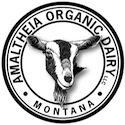Just a little north of Bozeman in Belgrade MT, the Amaltheia Dairy (and organic pork farm) is backed up to the Bridger Range of mountains. Pull into the drive and you’re met by the view of hundreds of milk goats – 500 is the latest count.
Mel and Sue Brown milk nearly 200 goats and, in their small cheese plant, they turn out award-winning chevre, ricotta, and feta cheese. The chevre comes in four flavors. Coming soon: Sue is experimenting with aged cheeses.
Following a “full circle” philosophy, the Browns manage – and profit from – what would ordinarily be waste products from their operation.
During the manufacturing process, cheese-making produces huge amounts of protein-rich whey. The most common way for small farms to dispose of whey is to use it as a soil amendment by spreading in on surrounding fields – challenging when you have a lot of it! At Amaltheia, the whey – which is an organic by-product – is feed to a herd of organic pigs.
At the same time, 500 goats and dozens of pigs produce a lot of manure. That waste is composted and bagged for sale to local gardeners. A fine example of turning a waste product that could be expensive to remove and dispose of, into a high-quality, value-added product that is much in demand.
Your GoodFood World cheese tasters gave all four flavors of Amaltheia Dairy chevre four thumbs up. Amaltheia cheeses are currently sold in food co-ops and natural food markets through out the western US and on the Amaltheia Dairy website, and Amaltheia organic pork is sold in markets in Montana.
Sue Brown, cheese maker, goat herder, and owner with her husband Mel of Amaltheia Dairy in Belgrade MT, describes how her farm and dairy are “closing the circle” by finding ways to profit from waste products like whey and manure. Sue answers the “unspoken” question: What to do with those male baby goats since they aren’t likely to earn their keep?


Thanks for hosting all the kids and parents at the feeding time this afternoon and giving the opportunity to teach about ” closing the circle”.